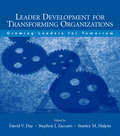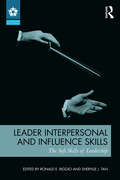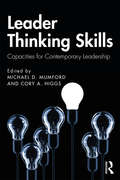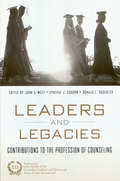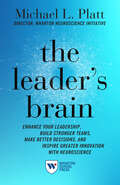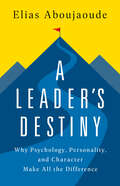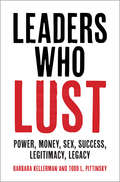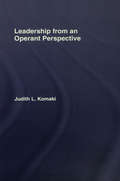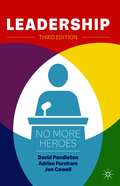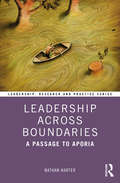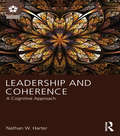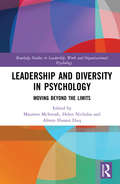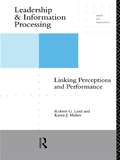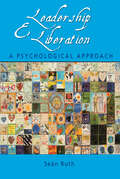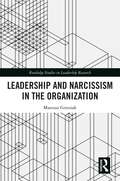- Table View
- List View
le Psychiatric Power Lectures at the Collège de France, 1973-1974
by Arnold I. Davidson Michel Foucault Graham Burchell Jacques Lagrange Francois Ewald Alessandro FontanaIn this new addition to the Coll#65533;ge de France Lecture Series Michel Foucault explores the birth of psychiatry, examining Western society's division of 'mad' and 'sane' and how medicine and law influenced these attitudes. This seminal new work by a leading thinker of the modern age opens new vistas within historical and philosophical study.
Lead Like a Pirate: Make School Amazing for Your Students and Staff
by Shelley Burgess Beth HoufAre You a Treasure Seeker? Pirates are on a constant quest for riches, but PIRATE Leaders seek even greater rewards: amazing schools, engaged students, and empowered educators who know they are making a difference. <P><P>In Lead Like a PIRATE, education leaders Shelley Burgess and Beth Houf map out the character traits necessary to captain a school or district. You'll learn where to find the treasure that's already in your classrooms and schools—and how to bring out the very best in your educators. - What does it take to be a PIRATE Leader? - Passion--both professional and personal - A willingness to Immerse yourself in your work - Good Rapport with your staff, students, and community - The courage to Ask questions and Analyze what is and isn't working - The determination to seek positive Transformation - And the kind of Enthusiasm that gets others excited about education <P><P>The ultimate goal for any education leader is to create schools and districts where students and staff are knocking down the doors to get in rather than out. This book will equip and encourage you to be relentless in your quest to make school amazing for your students, staff, parents, and communities. Are you ready to set sail?
The Leader
by Charles B. Strozier Daniel Offer Oliger AbdyliThis volume examines the lives of prominent leaders from ancient Greece to the present. It explores how these leaders imposed their individual missions and mystiques on others, thereby fulfilling , and sometimes creating, distinct needs in their followers.
Leader Development for Transforming Organizations: Growing Leaders for Tomorrow (Applied Psychology Series)
by David V. Day Stephen J. Zaccaro Stanley M. HalpinThis book examines numerous topic areas that are considered to be especially relevant for making a strategic leader development investment. The topics covered are areas that have theoretical and empirical connections to important aspects of growth, change, adult development, and underlying abilities, skills, and competencies needed to lead effectively in times of great complexity. In addition, these are investment areas identified by the U.S. Army--a world-class organization faced with the need for radical transformation--as particularly relevant for success and survival. This book identifies key concerns in developing leaders and leadership, and in transforming organizations to better meet the challenges of a complex world.There are two aspects of this book that distinguish it from the numerous existing volumes on leadership in the scholarly and popular-press literatures. Most important, the overarching focus of the present book is on development. There are many offerings on the topic of leadership, but relatively few that focus on leader development--especially from a scholarly, academic perspective. Also, this volume offers a unique perspective in examining those underlying psychological competencies and processes that are viewed as especially relevant for leader development.The chapters that are collected in this edited volume were originally commissioned by the U.S. Army Research Institute as "white papers" to better help Army officers and researchers understand important issues in leader development. The present organization of the papers is around four central themes: a) Accelerating Leader Development, b) Cognitive Skills Development, c) Developing Practical and Emotional Intelligence, and d) Enhancing Team Skills.
Leader Interpersonal and Influence Skills: The Soft Skills of Leadership (ISSN)
by Ronald E. RiggioThis edited volume explores different models, conceptualizations, and measures of leader interpersonal and influence "soft skills" that are so necessary for effective leadership. These include the communication skills, persuasion skills, political savvy, and emotional abilities used by leaders to inspire, motivate, and move followers toward the accomplishment of goals. The book emanates from the two-day-long 21st Kravis-de Roulet leadership conference, which brought together top scholars working in this area. The intent of the conference and this edited volume is to increase understanding of the interpersonal and influence skills, or "soft skills," of the leader, to highlight state-of-the-art research on the topic, and to provide clear, research-based guidelines for the development of leader skills.Chapter authors are recognized experts in their respective areas, and each section of the book will be introduced by an editor-authored chapter reviewing the specific topic area in brief.
Leader Interpersonal and Influence Skills: The Soft Skills of Leadership (Leadership: Research and Practice)
by Ronald E. Riggio Sherylle J. TanThis edited volume explores different models, conceptualizations, and measures of leader interpersonal and influence "soft skills" that are so necessary for effective leadership. These include the communication skills, persuasion skills, political savvy, and emotional abilities used by leaders to inspire, motivate, and move followers toward the accomplishment of goals. The book emanates from the two-day-long 21st Kravis-de Roulet leadership conference, which brought together top scholars working in this area. The intent of the conference and this edited volume is to increase understanding of the interpersonal and influence skills, or "soft skills," of the leader, to highlight state-of-the-art research on the topic, and to provide clear, research-based guidelines for the development of leader skills.Chapter authors are recognized experts in their respective areas, and each section of the book will be introduced by an editor-authored chapter reviewing the specific topic area in brief.
Leader Thinking Skills: Capacities for Contemporary Leadership
by Michael D. Mumford Cory A. HiggsThis book examines the various thinking skills that leaders may need to find success in contemporary organizations and institutions, covering a wide array of skills that are held to be important by key leadership scholars. Bridging theory and practice, chapters summarize major findings with respect to a particular ability, knowledge, or skill, providing theoretical frameworks for understanding how these contribute to leader emergence and performance, and considering implications for leader selection, assessment, and development. The text appraises the existing research on the critical cognitive capabilities that underlie leader problem-solving and implications for the assessment and development of leadership potential in real-world settings. The role of creative thinking skills on leader performance is also addressed, bearing on the importance of processes such as problem definition and idea generation, but also using constraints to potentially stimulate creative thought. With contributions from some of the most eminent scholars working in the field of leadership, this book will be in invaluable resource to academics, researchers, graduate students, and professionals interested in leadership and leader skills, I/O psychology, and business management.
Leaderful Classroom Pedagogy Through an Interdisciplinary Lens: Merging Theory with Practice
by Soyhan Egitim Yu UmemiyaThis book focuses on the impact of teachers’ leadership identity on their pedagogical and class management choices and proposes a new pedagogical framework, leaderful classroom practices which emerged through collective, concurrent, collaborative, and compassionate interactions between the teacher and students. The interdisciplinary aspect of the book appeals to a wide range of readers from different disciplines and gives readers the opportunity to take a moment and reflect on their leadership identity, recognize the limitations of their practices, and adopt a leaderful pedagogy in their respective disciplines. Establishing an open, democratic, and participatory learning environment for all learners is a major leadership responsibility of teachers, and this book demonstrates how to accomplish this mission both in theory and practice.
Leaders and Legacies: Contributions to the Profession of Counseling
by John West Don Bubenzer Cynthia OsbornLeaders and Legacies discusses leadership involvements in the historical development of the profession of counseling. The lives of 23 noteworthy counselors are also chronicled, documenting their dreams, work and accomplishments.
The Leader's Brain: Enhance Your Leadership, Build Stronger Teams, Make Better Decisions, and Inspire Greater Innovation with Neuroscience
by Michael PlattA pioneering neuroscientist reveals how brain science can transform how we think about leadership, team-building, decision-making, innovation, marketing, and more.Leadership is a set of abilities with which a lucky few are born. They’re the natural relationship builders, master negotiators and persuaders, and agile and strategic thinkers.The good news for the rest of us is that those abilities can be developed. In The Leader’s Brain: Enhance Your Leadership, Build Stronger Teams, Make Better Decisions, and Inspire Greater Innovation with Neuroscience, Wharton Neuroscience Initiative director Michael Platt explains how. Over two decades as a professor and practitioner in neuroscience, psychology, and marketing, Platt’s pioneering research has deepened our understanding of how key areas of the brain work—and how that understanding can be applied in business settings. Neuroscience is providing answers to many of leadership’s most vexing challenges. In The Leader’s Brain, Platt explains: Why two managers, when presented with the same set of information, make very different decisions; Why some companies (Apple) build strong social and emotional connections with their customers and others do not (Samsung); How some of the most significant events in sports history, like the “Miracle on Ice,” contain insights for how to build a team; Why even some of the most visionary business leaders can make disastrous decisions, and how to fix that.The Leader’s Brain relates findings like these, and many more, to help enhance leadership in an ever-shifting world entering a “new normal.” In this fast-reading and engaging guide, you’ll gain actionable insights you can put into practice as a leader. You will also learn what’s going on in your team’s brains when they are working in sync with one another, how you can tweak your message delivery to make sure others hear you, how to encourage greater creativity and innovation, and much more.
A Leader's Destiny: Why Psychology, Personality, and Character Make All the Difference
by Elias AboujaoudeA psychiatrist puts leadership &“on the couch,&” with a provocative exploration of its crucial, often ignored, psychological and personal character foundations. Elias Aboujaoude&’s distinctive exploration of leadership explains how our cultlike obsession with leadership gives narcissists and sociopaths an edge and results in leadership failure everywhere we look—and how resisting the imperative to rise at all costs leaves many with an inferiority complex. His takedown of the leadership industrial complex pokes a very sharp elbow into an industry seemingly united in a modern form of alchemy to create leadership gold—a waste of time and money, Aboujaoude vividly illustrates, since leaders emerge from a unique combination of personal, psychological, and situational factors that cannot be easily controlled or manipulated, no matter how gifted the executive coach. This bracing take on a classic subject provides new insight into the way psychology aligns with the requirements of effective and happy leadership. The result is to empower us to understand ourselves and step up if we have what it takes to lead—or find equally rewarding, often superior, ways to achieve fulfillment if we don&’t.
Leaders in Transition: The Tensions at Work as New Leaders Take Charge
by Gilles Amado Richard ElsnerLeaders in Transition brings a new perspective on why some leaders succeed more than others when taking charge of an organisation. Based on in-depth case studies, when four new leaders and their teams in large and complex international organisations were tracked for over a year, this book uncovers that success in managing transition is directly related to leaders' ability to balance tensions, appropriately to the context. The reasons for each leader's effectiveness are explored and analysed, allowing the authors then to extrapolate some general conclusions about the ways in which these tensions reveal themselves during all leadership transitions. Evidently, the success or failure of a new leader is the result of the way multiple actors (the new leader, his or her boss, his organisation and its stakeholders) behave, before and during the taking charge. These multiple interactions are revealed and discussed.
Leaders Who Lust: Power, Money, Sex, Success, Legitimacy, Legacy
by Barbara Kellerman Todd L. PittinskyAmong our greatest leaders are those driven by impulses they cannot completely control - by lust. Lust is not, however, an abstraction, it has definition. Definition that, given the impact of leaders who lust, is essential to extract. This book identifies six types of lust with which leaders are linked: 1. Power: the ceaseless craving to control. 2. Money: the limitless desire to accrue great wealth. 3. Sex: the constant hunt for sexual gratification. 4. Success: the unstoppable need to achieve. 5. Legitimacy: the tireless claim to identity and equity. 6. Legacy: the endless quest to leave a permanent imprint. Each of the core chapters focuses on different lusts and features a cast of characters who bring lust to life. In the real world leaders who lust can and often do have an enduring impact. This book therefore is counterintuitive - it focuses not on moderation, but on immoderation.
Leadership: The Operant Model of Effective Supervision (People and Organizations)
by Judith L. KomakiHow can managers motivate their employees? After conducting detailed field studies of work groups in settings as diverse as insurance company offices and regatta sailboats, Judith Komaki has identified two key behaviours that seem to distinguish effective from ineffective managers; monitoring workers' performance and communicating consequences. Drawing on her research over the last ten years, Komaki combines behavioural and cognitive theories of leadership and puts forward a new model for the study of leadership from an operant perspective.
Leadership: No More Heroes
by David Pendleton Adrian F. Furnham Jonathan CowellLeadership is most needed in times of change, uncertainty and crisis. We are living through those times. To support leaders in all spheres, this book provides a guide to the territory of leadership and its three domains: the strategic (head), the operational (hands) and the interpersonal (heart). It describes the tasks leaders have to achieve and explains the psychology of leadership based in personality. It argues strongly that complete leadership is the province of diverse teams of leaders made up of complementary differences. And now the best has just got better. The new edition shows how leadership has to change over time, describes how the most highly rated leaders achieve their goals and also elucidates the neuroscience of leadership to enhance understanding of leadership’s foundations. Pendleton, Furnham and Cowell’s work is a powerful combination of the best research on the psychology of leadership and years of iteration and practical implementation in the field – working with thousands of leaders from all walks of life and learning from their successes and challenges. There is no one secret recipe for success as a leader. What this book provides is a framework to enable you to achieve success in your own way.
Leadership 4.0 – Effektive Führung in der Arbeit 4.0: Manual (SpringerTests)
by Julia Nogga Jens RowoldWie können Führungskräfte in der digitalen Arbeitswelt ihre Mitarbeitenden bzw. Arbeitsteams motivieren und an die Organisation binden? Welche führungsbezogenen Verhaltensweisen sind dabei unverzichtbar? Welche Instrumente können Personaler*innen nutzen, um Führungskräfte auf die neuen Herausforderungen der Arbeitswelt 4.0 vorzubereiten? Hier erhalten Sie den ersten Fragebogen der Führungsverhalten in digitaler Umgebung messen kann.Wie von der Praxis benötigt, kombiniert dieses Modell eine Vielzahl effektiver Verhaltensweisen, woraus ein neuer Führungsstil entsteht. Dieser beinhaltet dabei vier Facetten von Verhaltensweisen, die nachgewiesenermaßen relevant für den Erfolg von Führungskräften und ihre jeweilige Organisation sind.Dazu zählen:a) die Partizipationb) die Arbeitsgestaltung (räumliche, zeitliche und technologisch)c) die individuelle Entwicklungd) die TeamentwicklungDie vier Facetten von bilden eine angemessene Grundlage, aktuelle Aufgaben und Probleme der organisationalen Praxis zu bewältigen. Durch die veränderten Arbeitsbedingungen der Arbeit 4.0 ergeben sich zahlreiche Herausforderungen, mit denen Führungskräfte in Unternehmen konfrontiert sind. Die Grenzen zwischen Erwerbsarbeit und privatem Freizeitbereich verwischen zunehmend, sodass Mitarbeitende einerseits mehr Partizipation, andererseits mehr subjektiv erlebte Relevanz in ihrem Job erleben möchten. Deswegen müssen Führungskräfte ihren Mitarbeitenden die Möglichkeit geben, sich an Entscheidungen im Unternehmen zu beteiligen. Dies kann erfolgen, indem Führungskräfte ihren Mitarbeitenden ermöglichen, Einfluss auf Arbeitsinhalte zu nehmen oder Prozessinnovationen anzustoßen.Da ein Fachkräftemangel auf dem Arbeitsmarkt herrscht, steigt die Bedeutung, kompetente Mitarbeitende im Unternehmen zu halten. Wenn es darum geht, die emotionale Verbundenheit der Mitarbeitenden mit dem Unternehmen zu fördern, spielen Führungskräfte eine wichtige Rolle. Dass Führungskräfte dieses affektive Commitment bei den Mitarbeitenden hervorbringen können, ist von empirischen Studien belegt. Diesbezüglich ist auch die Arbeitszufriedenheit der Mitarbeitenden von Relevanz, denn viele Studien bestätigen den Zusammenhang von Führung und Arbeitszufriedenheit.
Leadership Across Boundaries: A Passage to Aporia (Leadership: Research and Practice)
by Nathan HarterLeadership Across Boundaries: A Passage to Aporia theorizes on leadership in an unprecedented manner by stepping outside of conventional leadership theory and importing into leadership studies the implications of certain innovations in the social sciences, such as pluralism, complexity theory, and the dialogical turn, to change the way scholars discuss and study leadership. Leadership Across Boundaries anchors theoretical passages that generate a new way of imagining what it means to lead and follow with concrete examples about Martin Luther, the Common Law, dialogue as a practice, a painting by Diego Velázquez, synchronized fireflies, and the strange career of Francis of Assisi. This book acknowledges the limitations of existing leadership research as being too leader-centric, simplistic, static, and in many cases oblivious to the power of images to shape our understanding. To rectify these limitations, Leadership Across Boundaries examines alternative images of leadership grounded in concrete examples that present leadership in an unprecedented light. The book includes a discussion of invigorating ideas of homeward leadership (looking backward), extra-ordinary leadership (going forward), and what will be defined as the perennial need for aikido politics. An interdisciplinary text, Leadership Across Boundaries: A Passage to Aporia will appeal not only to scholars, instructors, and students of leadership, but also to those in the many fields in which leadership theory applies, such as history, economics, sociology, archetypal psychology, the law, political philosophy, applied mathematics, and the martial arts.
Leadership after COVID-19: Working Together Toward a Sustainable Future (Future of Business and Finance)
by Satinder K. Dhiman Joan F. MarquesThe COVID-19 pandemic has permanently changed lives around the world and no dimension of life and leadership seems to have been spared from its wrath. It has also stirred us into thinking about novel approaches to lead organizations and societies toward a shared, sustainable future. This book offers novel perspectives on leadership and change management after the COVID-19 pandemic that take us beyond striving for thriving—perspectives that are grounded in emergent theory, research and practice. It highlights sustainable leadership and change management strategies to effectively deal with unpredictable and rapidly changing situations—particularly in a world that is increasingly volatile, uncertain, complex, and ambiguous (VUCA). This book also highlights engaging perspectives by specialists from different disciplines such as business, psychology, education, and health care. It serves as a practical guide in identifying and responding to leadership challenges and opportunities in each of the four VUCA categories of volatility, uncertainty, complexity, and ambiguity—and how they affect businesses, organizations, and societies as a whole.
Leadership and Coherence: A Cognitive Approach (Leadership: Research and Practice)
by Nathan W. HarterLeadership and Coherence investigates how leaders justify their decisions, and how they bring about coherence amongst followers. Taking a cognitive approach, it builds on the work of Hannah Arendt to attempt a phenomenology of judgment, examining how the moral imperative experienced by leaders can be shared by their community so both leader and led are guided by a mutual purpose. Through biographical case studies of historical leaders, this book illustrates how successful leaders operate in a turbulent world, not only making their own decisions but also gathering likeminded followers to share in a common vision and shared sense of purpose.
Leadership and Collaboration in Workplace Discourse: From Field to Application (Communicating in Professions and Organizations)
by Małgorzata ChałupnikThis book presents a comprehensive examination of how leadership and collaboration are discursively performed in professional communication, using real-world data from a UK public sector IT team. Taking an auto-ethnographic approach to workplace talk, the author examines the language involved in the performance of different team-based professional roles, examining how professional identity and relationships are indexed through casual face-to-face talk in an office environment. This investigation of how a group of people come together in an effort to achieve shared workplace goals relates to key debates in the area of professional communication, putting forward new theoretical and methodological frameworks for understanding and analysing how person-orientated aspects of professional communication shape discourses of work. This book appeals to a wide and interdisciplinary audience, including advanced undergraduate and postgraduate students, academics and researchers specialising in applied linguistics broadly, and professional communication in particular, as well as consultants and practitioners working across a wide range of professional sectors.
Leadership and Diversity in Psychology: Moving Beyond the Limits (Routledge Studies in Leadership, Work and Organizational Psychology)
by Maureen McIntosh Helen Nicholas Afreen Husain HuqLeadership and Diversity in Psychology explores the topic of leadership and diversity from a range of different perspectives. The authors draw from professional experience and research to support their reflections on leadership with diverse populations, leadership in organizations and developing leadership style. Incorporating current theory and up-to-date research concerning current trends towards more relational and integrative work, the book emphasises practitioners’ reflections of their own experience. It reflects the contemporary focus towards more pluralistic/integrative practice, which has moved away from traditional orientations involving specific ways of working. Leadership and Diversity in Psychology will be of great interest to academics and researchers in the fields of clinical and counselling psychology and organizational psychology as well as professional practitioners.
Leadership and Information Processing: Linking Perceptions and Performance (People and Organizations)
by Robert G. Lord Karen J. MaherExecutive leadership is critically important to understanding the workings and performance of organizations, yet it is a topic that is usually ignored by mainstream leadership research. Leadership and Information Processing provides a much-needed analysis of this crucial element of organizational behaviour. Robert G. Lord and Karen J. Maher examine how executives make decisions and how decision acceptance is constrained by the leadership perceptions of others. Focussing in particular on leadership and social perceptions, perceptions of female leaders, organizational culture, and the effects of executive succession. Leadership and Information Processing offers crucial information for students, researchers and teachers of mangement, business, organizational behavior and organizational/social psychology.
Leadership and Liberation: A Psychological Approach
by Seán RuthHow do leaders influence the people around them? Is leadership about having particular personality traits or is it about what leaders actually do and the types of relationships they build? This ground-breaking book looks at how to be an effective leader. It presents a model of leadership that has many practical implications for those who occupy formal leadership roles or who seek to influence events informally. This model views leadership as a collaborative, influence process rather than a hierarchical or authoritarian one. By looking at leadership in the context of liberation, it provides the reader with an alternative perspective, enabling them to think about their own aims and effectiveness as a leader. It analyses our understanding of oppressed and oppressor groups and how processes of mistreatment develop and become institutionalised. From this standpoint, effective leadership is presented as a means of confronting inequality and initiating positive change. The practical skills required by leaders to assist them in becoming agents of change and influence, and in dealing with the inevitable conflicts that arise in complex interpersonal situations, are considered. The reasons why leaders are targets of attack are also looked into, as well as the situations in which they can act as a positive force for transformation. Containing an in-depth review of the development of leadership theory, Leadership and Liberation also critically evaluates main-stream approaches and analyses the implications for leaders on the ground. The lessons to be learned are applicable to leaders in all types of groups and organisations and will be of interest to those studying psychology, business and management.
Leadership and Management of Clinical Trials in Creative Arts Therapy
by Felicity Anne BakerThis book focuses on leadership and management strategies including project management, budget planning and management, governance, building a team, and developing a strategy for successful recruitment. Many creative arts therapy researchers lack training and experience in designing and implementing large scale high impact clinical trials. This book is the first in the creative arts therapies that provides guidance on clinical trial implementation. Data management, monitoring, and intervention fidelity and development of a statistical analysis plan are outlined. Finally, the text explores development of a dissemination plan as well as how to commercialise research.
Leadership and Narcissism in the Organization (Routledge Studies in Leadership Research)
by Mateusz GrzesiakNarcissists are seen as people who could inspire others due to their strong charisma great vision and ability to convince the crowd that they possess features that others don’t. They have followers and fans, and the ability to control them. On the other hand, narcissistic leaders express a lack of empathy and high levels of aggression and show constant criticism of others while refusing feedback on their performance. Those features indicate that such leaders have a strong sense of entitlement of superiority; therefore, it is hard to work with them. In the corporate world, many individuals with narcissistic personalities are chosen as leaders of organizations or teams, which often harms their co-workers and subordinates. Very few lower-level employees have a positive perception of their narcissistic leaders or are satisfied with their job, and so there is need to measure through qualitative research based on already existing articles in a given subject the correlation between the perception of narcissistic leader and the leader evaluation method. This book gives insight into psychology and management by linking the narcissistic personality with the leadership role and with the method of evaluating a leader, along with discussing the positive or negative outcomes of their leadership. Readers will learn about the phenomenon of narcissistic individuals and leaders as well as the attributes and traits of such a person. This research monograph will be of interest to researchers, academics, and advanced students in the fields of work and organizational psychology and leadership studies.



